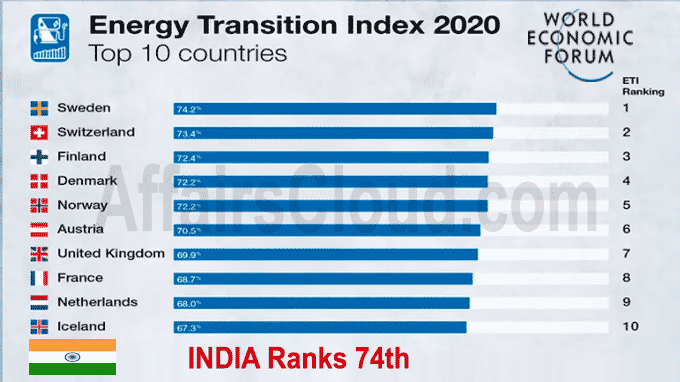 On May 13, 2020 According to the World Economic Forum(WEF)’s global Energy Transition Index(ETI) 2020, India has moved up two places from rank 76th(2019) to 74th with a score of 51.5%, Sweden(74.2%) topped for the 3rd consecutive time followed by Switzerland(73.4%) and Finland(72.4%). The index is a composite score of 40 indicators, benchmarks 115 countries on the current performance of their energy system, and readiness for transition to a secure, sustainable, affordable, and inclusive future energy system.
On May 13, 2020 According to the World Economic Forum(WEF)’s global Energy Transition Index(ETI) 2020, India has moved up two places from rank 76th(2019) to 74th with a score of 51.5%, Sweden(74.2%) topped for the 3rd consecutive time followed by Switzerland(73.4%) and Finland(72.4%). The index is a composite score of 40 indicators, benchmarks 115 countries on the current performance of their energy system, and readiness for transition to a secure, sustainable, affordable, and inclusive future energy system.
- The scores of ETI are on a scale from 0% to 100%.
Rank List
| Country | Rank |
|---|---|
| India | 74 |
| Sweden | 1 |
| Switzerland | 2 |
| Finland | 3 |
Major Highlights
i.94 countries have made progress since 2015, representing 70% of the global population but environmental sustainability continues to lag.
ii.For the 1st time the United States(32nd) ranks outside the top 25% primarily due to the uncertain regulatory outlook for energy transition.
iii.France (8th) and the United Kingdom (7th) are the only G20 countries in the top ten. China, India, and Italy made consistent improvements on overall ETI score since 2015 & Russia, Japan, South Korea and Germany made moderate gains.
iv.11 countries have made steady progress each year since 2015, including Argentina, China, India and Italy who are among the major countries. The countries like Bangladesh, Bulgaria, Czech Republic, Hungary, Kenya, and Oman have also made significant gains over time.
v.The scores for Canada, Chile, Lebanon, Malaysia, Nigeria and Turkey are declining since 2015.
Key Points
i.There is 55.1% of the Global average of ETI score 2020, which is an improvement by 2% points since 2015.
ii.75% of countries have improved their environmental sustainability. This improvement is the result of multifaceted, incremental approaches which include pricing carbon, retiring coal plants ahead of schedule and redesigning electricity markets to integrate renewable energy sources.
iii.20% of the global population uses as much energy as the remaining 80%. 3% of expected decline in coal power generation globally in 2019, according to Carbon Brief analysis
iv.As per the WEF’s survey of the Global Shapers’ Community 70% of the young people consider the speed of energy transition to be either stagnant or too slow. There is less than 1% Increase in the average ETI score of countries in the top quartile since 2015.
Performance of India
i.India’s improvements have come across all three dimensions of the energy triangle namely- economic development and growth, energy access and security, and environmental sustainability. It indicates a strong positive trajectory, driven by strong political commitment and an enabling policy environment.
ii.It’s gains are from a government-mandated renewable energy expansion programme, now extended to 275 GigaWatt(GW) by 2027.
iii.It has made significant progress in energy efficiency by bulk procurement of LED bulbs, smart meters, and programs for labelling of appliances. Similar measures are being experimented to drive down the costs of electric vehicles.
Suggestions
According to the latest edition of WEF’s Fostering Effective Energy Transition 2020 report the policies, roadmaps and governance frameworks for energy transition at national, regional and global levels need to be more vigorous and resilient against external shocks.
Methodology
ETI- Combination of System Performance score(50%)& Transition Readiness score(50%).
About WEF:
Headquarters– Cologny/Geneva, Switzerland
Founder and Executive Chairman– Klaus Schwab




